Engineers introduce nanoparticle thermotherapy as a chemotherapy alternative
Using hyperthermia, Virginia Tech engineering researchers and a colleague from India unveiled a new method to target and destroy cancerous cells.
Nov 23rd, 2010
Read more
Using hyperthermia, Virginia Tech engineering researchers and a colleague from India unveiled a new method to target and destroy cancerous cells.
Nov 23rd, 2010
Read moreBoston University researchers have developed a simple diagnostic tool that can quickly identify dangerous viruses like Ebola and Marburg. The biosensor, which is the size of a quarter and can detect viruses in a blood sample, could be used in developing nations, airports and other places where natural or man-made outbreaks could erupt.
Nov 22nd, 2010
Read more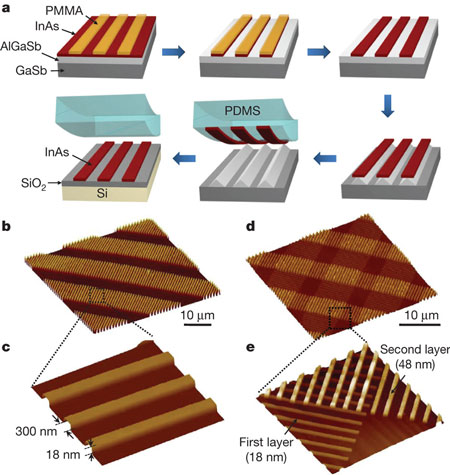 There's good news in the search for the next generation of semiconductors. Researchers with the U.S. Department of Energy's Lawrence Berkeley National Laboratory (Berkeley Lab) and the University of California (UC) Berkeley, have successfully integrated ultra-thin layers of the semiconductor indium arsenide onto a silicon substrate to create a nanoscale transistor with excellent electronic properties.
There's good news in the search for the next generation of semiconductors. Researchers with the U.S. Department of Energy's Lawrence Berkeley National Laboratory (Berkeley Lab) and the University of California (UC) Berkeley, have successfully integrated ultra-thin layers of the semiconductor indium arsenide onto a silicon substrate to create a nanoscale transistor with excellent electronic properties.
Nov 22nd, 2010
Read moreThe science that helped make today's smartphones and iPods smaller but more powerful than yesterday's desktop computers highlights the latest episode in the American Chemical Society (ACS) Prized Science video series.
Nov 22nd, 2010
Read moreNew research in the FASEB Journal shows how combining photoacoustic tomography with gold nanobeacons allows researchers to see blood vessel formation in detail without a microscope.
Nov 22nd, 2010
Read more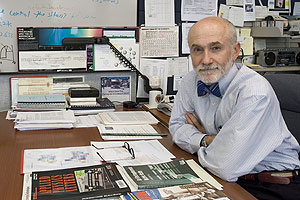 A discovery by University of Cincinnati engineering researcher Andrew Steckl could revolutionize display technology with e-paper that's fast enough for video yet cheap enough to be disposable.
A discovery by University of Cincinnati engineering researcher Andrew Steckl could revolutionize display technology with e-paper that's fast enough for video yet cheap enough to be disposable.
Nov 22nd, 2010
Read more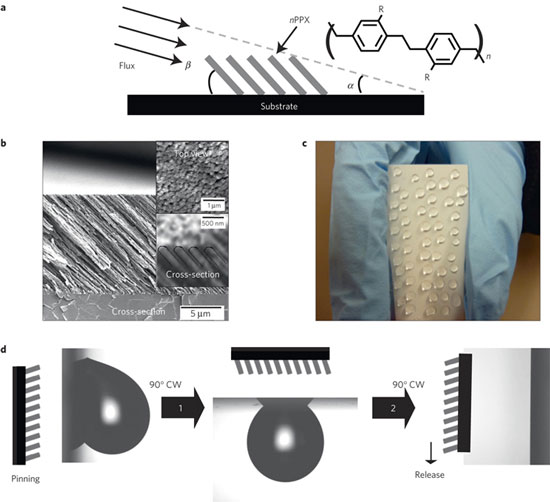 Scientists at the Naval Research Laboratory are part of a research team working to engineer surfaces that imitate some of the water repellency features found in nature. This technology offers the possibility of significant advances for producing new generations of coatings that will be of great value for military, medical, and energy applications.
Scientists at the Naval Research Laboratory are part of a research team working to engineer surfaces that imitate some of the water repellency features found in nature. This technology offers the possibility of significant advances for producing new generations of coatings that will be of great value for military, medical, and energy applications.
Nov 22nd, 2010
Read moreIssues addressed will include alternatives to bulk technologies for 20nm nodes and below and sub-16nm CMOS technologies.
Nov 22nd, 2010
Read more Scientists at Empa, the Swiss Federal Laboratories for Materials Science and Technology, have developed a high performance plaster which boasts a thermal insulation value three-times better than convention plaster thanks to so-called aerogels.
Scientists at Empa, the Swiss Federal Laboratories for Materials Science and Technology, have developed a high performance plaster which boasts a thermal insulation value three-times better than convention plaster thanks to so-called aerogels.
Nov 22nd, 2010
Read more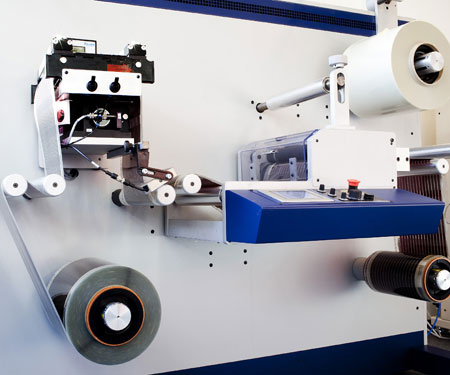 Risoe DTU is going to put a newly developed test platform for polymer solar cells into production. The test platform will be transformed from a prototype into production ready 0-Series in collaboration with the Zealandic company 'LS Control'.
Risoe DTU is going to put a newly developed test platform for polymer solar cells into production. The test platform will be transformed from a prototype into production ready 0-Series in collaboration with the Zealandic company 'LS Control'.
Nov 22nd, 2010
Read moreThe German Innovation Alliance for Carbon Nanotubes will hold its annual conference in Ettlingen (near Karlsruhe, Germany) on 25th-27th January. This year the conference will be open to national and international visitors from research and industry. It offers a platform for the international CNT community to exchange results and ideas.
Nov 22nd, 2010
Read moreIn the search for efficient, durable and commercially viable fuel cells, scientists at the University of Ulster's Nanotechnology Institute and collaborators from Peking University and University of Oxford have discovered a new catalyst-support combination that could make fuel cells more efficient and more resistant to carbon monoxide poisoning.
Nov 22nd, 2010
Read moreIn einem Antrag fordern die Abgeordneten die Bundesregierung auf, das 'Inverkehrbringen von verbrauchernahen Produkten mit Nanosilber' zu verbieten und eine Liste aller auf dem Markt erhaeltlichen Erzeugnisse zu erstellen und der Oeffentlichkeit zugaenglich zu machen.
Nov 22nd, 2010
Read moreThe Fuel Cell Nano-Materials Group at International Center for Materials Nanoarchitectonics has successfully developed two types of novel proton conducting oxide electrolytes for solid oxide fuel cells (SOFCs). By applying these electrolytes, the commercialization of SOFCs operating in the intermediate temperature range, 500C to 650C, has come into sight.
Nov 22nd, 2010
Read morePurdue University has been awarded $1.5 million to study quantum information science, a new field paving the way for quantum computing - a novel method to process information that is faster, more powerful and more efficient than classical computing.
Nov 21st, 2010
Read more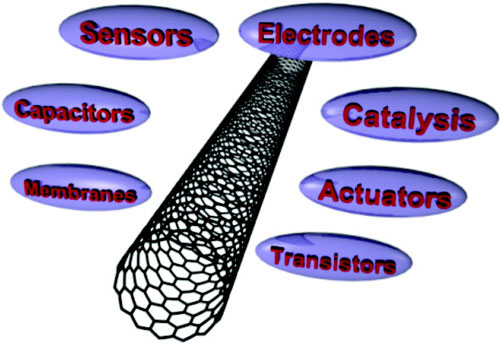 Jan M. Schnorr and Timothy M. Swager from the Department of Chemistry and Institute for Soldier Nanotechnologies at MIT have published an overview of a variety of applications that are based on the unique properties of pristine as well as functionalized carbon nanotubes.
Jan M. Schnorr and Timothy M. Swager from the Department of Chemistry and Institute for Soldier Nanotechnologies at MIT have published an overview of a variety of applications that are based on the unique properties of pristine as well as functionalized carbon nanotubes.
Nov 21st, 2010
Read more